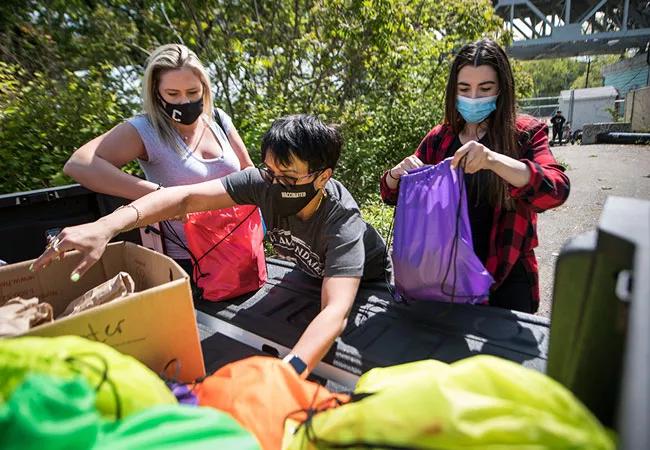Project leads to a community outreach group

When the COVID-19 pandemic began last spring, frontline caregivers in the emergency department at Cleveland Clinic main campus received donated lunches a couple times a week from people thanking them for their service. “We were grateful, but we felt guilty,” says Brian Holbrook, RN, a charge nurse in the emergency department (ED). “We care for a large indigent population, so we would often eat lunch and then take care of homeless patients. They weren’t worried about getting COVID. They were more concerned about where their next meal would come from – something we take for granted.”
Advertisement
Cleveland Clinic is a non-profit academic medical center. Advertising on our site helps support our mission. We do not endorse non-Cleveland Clinic products or services. Policy
Holbrook and his peers in the ED decided to take action. They launched a grassroots project to provide essential items to help temporarily ease the burden of homeless people.
Last April, Holbrook emailed ED employees asking for donations of socks, sunscreen, soap, feminine hygiene products, toothpaste, toothbrushes and other items. Then in mid-July, nurses, health unit coordinators, paramedics and other staff in the ED filled more than 50 backpacks with the items, along with masks.
Volunteers handed out the backpacks to homeless people outside the men’s and women’s homeless shelters in Cleveland, as well as in areas where at-risk populations often congregate. In addition to the backpacks, the caregivers distributed lunch bags with sandwiches, crackers, fruit and water provided by a nurse in the rapid observation unit.
“As frontline caregivers, we were given so much during the pandemic,” says Holbrook. “We wanted to give a little bit back.”
The backpack project wasn’t a one-time venture. Holbrook and his colleagues have begun collecting items for a second round of backpack donations, hoping to hand out more than 100 this time around.
In addition, Holbrook has teamed with Betsy Martinez, RN, a clinical nurse in the ED, and Annaliese Mobasseri, patient access services representative, to create a group called Caregivers for Community. The group has several ideas to support the hospital’s surrounding neighborhood, including planting a community garden. They are partnering with the Office of Government and Community Relations to brainstorm other potential projects.
Advertisement
“Caregivers for Community is trying to harness the resources Cleveland Clinic already has – and that’s people – to do more for the neighborhood we are in,” says Holbrook. “As team members at Cleveland Clinic, we should be going out and doing what we can to help the community that supports us.”
Throughout the COVID-19 pandemic, Cleveland Clinic nurses have remained committed to helping homeless people. Check out this article on a collaboration to provide safe places for COVID-19-positive homeless patients to recover.
Advertisement
Advertisement

Planning continues with critical, patient-focused input from nursing teams

Strengthening care through targeted resources and frontline voices

Embracing generational differences to create strong nursing teams

CRNA careers offer challenge and reward

An unexpected health scare provides a potent reminder of what patients need most from their caregivers

Cleveland Clinic Abu Dhabi initiative reduces ICU admissions and strengthens caregiver collaboration

Veteran nurse blends compassion, cutting-edge transplant training and military tradition to elevate patient care

Embrace coaching and other tips to be a stronger leader